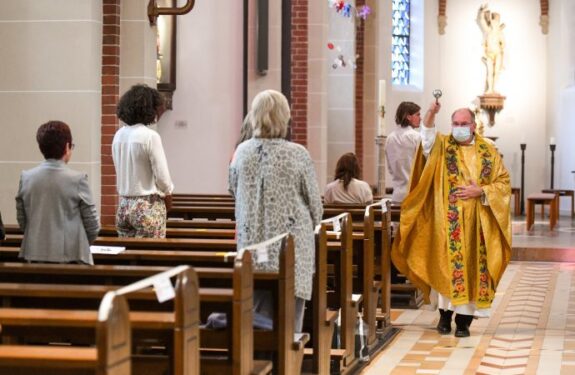
By Inés San Martín
(Crux) — A German bishop says Pope Francis expressed a “dramatic concern” over the Catholic Church in Germany and its “synodal path” of reform that began last year, which could include reviewing “taboo” issues such as priestly celibacy and a female priesthood.
Pope Francis’ comments were reported made at Wednesday’s general audience during a conversation with Bishop Heinz Josef Algermissen, the retired bishop of Fulda.
Bishop Algermissen spoke on the phone with German newspaper “Fuldaer Zeitung'” after meeting the pontiff.
Pope Francis, Bishop Algermissen said, expressed with “clear words and dramatic concern” his views on the “synodal path” – a process of reform launched by the German Catholic church bringing together German lay people and bishops to discuss four major topics: The way power is exercised in the Church; sexual morality; the priesthood; and the role of women in ministries and offices in the Church.
The process has a Synodal Assembly, composed of 230 members including archbishops and bishops, and an equal number of laypeople, and is motivated in part by a desire to stop a hemorrhaging of members from the Catholic Church in Germany, with thousands reportedly leaving the institution every year.
According to some German prelates, everything is up for debate, and the synodal path is “binding.”
However, Pope Francis warned Catholics in Germany last year not to attempt to go their own way, because they don’t walk alone but with the universal Church.
According to Bishop Algermissen, Francis mentioned his letter to the “pilgrim people of God in Germany” during their conversation, and regretted the fact that it was widely ignored by German dioceses. The German bishop says the pontiff would want the church to focus on evangelizing an increasingly secularized country, and is instead focusing on “political issues,” such as women priests and celibacy.
In the letter penned in June 2019, Pope Francis also reminds the Germans that a “structural” reform, simply changing to adapt to modern times, is not a solution.
The Church’s raison d’etre, he wrote, is that God “so loved the world that he gave his only Son so that all who believe in him may not die but may have eternal Life.”
In the letter, Pope Francis argues that the transformation and revitalization sought after with a synod cannot simply be a “reaction to external data or demands,” including a drop in births and aging communities.
Though these are “valid concerns,” Pope Francis wrote, seen outside the ecclesial mystery they could cause a reactionary attitude. Believing that solutions are purely structural, he argued, is “one of the first great temptations at the ecclesial level.”
“Without having the Gospel as its soul,” he wrote, a well-organized and even modernized ecclesial body could become a “gaseous” Christianity that has no evangelical zeal.
“Each time the ecclesial community tries to leave its problems alone and focuses exclusively on its forces or its methods, its intelligence, its will or prestige, it ends up increasing and perpetuating the evils it was trying to solve,” he said.
The first synodal assembly of the German church took place in Frankfurt at the end of January. Smaller regional conferences were held in September, after a pause due to the COVID-19 pandemic.
The possibility of the birth of a “German national church” as a result of the synodal path is one that has been floated as a warning from several members of the German hierarchy, including Cologne Cardinal Rainer Maria Woelki, who at the end of the September synodal assemblies said: “The worst outcome would be if the Synodal Path leads to a schism … with the universal church.”
Speaking with Germany edition of the Catholic News Agency, Cardinal Woelki said he wanted participants to avoid creating “unfulfillable hopes” on the ordination of women priests, because the matter had been settled by St. John Paul II, and Francis is on record saying he considers the issue closed.
“I cannot treat it as if the question were open,” the cardinal said. “In that case, the discussion takes place outside the teaching of the church.”
Bishop Algermissen’s recollection of his exchange with Pope Francis echoes comments made by the Cardinal Kurt Koch, President of the Vatican’s Council for Promoting Christian Unity. Last month, the Swiss cardinal said that in personal conversations with Francis, the pontiff had express concerns over the Church in Germany.
However, Bishop Georg Bätzing, the president of the German bishops’ conference, said Francis “appreciates” the synodal path after he met with the pontiff last year.
